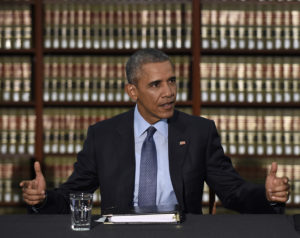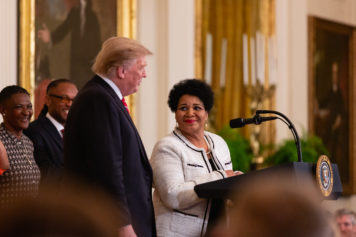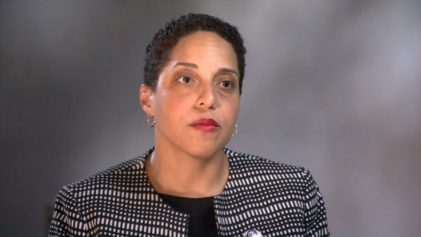
President Barack Obama participates in a discussion at Newark Rutgers University Center for Law and Justice in Newark, N.J., Monday, Nov. 2, 2015. (AP Photo/Susan Walsh)
President Obama announced his decision to direct federal agencies to “ban the box”—the questions on government job applications that ask prospective employees about their criminal history, often serving as an obstacle to employment for the formerly incarcerated. This comes as the President plans to cement his legacy on race relations.
On Monday, the president spoke to lawmakers, ex-offenders, students and activists at a roundtable discussion at Rutgers University in Newark, New Jersey, and also visited a residential drug treatment clinic known as Integrity House.
As was reported by the Guardian, Obama praised ex-offenders who reintegrated back into society, emphasizing “it’s not too late” for people to extricate themselves from the criminal justice system.
“When you meet folks who are taking that step to beat addiction and overcoming great odds and you see what they have already accomplished and what they are going to accomplish in the future, you cannot help but feel hopeful,” he said. “We’ve got to make sure that people who’ve paid their debt to society can earn a second chance. We can’t have the criminal justice system carrying the entire load of society’s ills.”
President Obama noted that over 600,000 people are released from prison each year, and the nation pays $80 billion each year to imprison over 2.2 million people. He also said that more than 70 million people have a criminal record, a daunting statistic amounting to one in every three working-age Americans. According to a 2009 study, 60 to 75 percent of the formerly incarcerated were unemployed up to a year after their release from prison. Criminal justice reform would save money and create a “virtuous cycle” rather than lock poor, Black and Latino people through a system of prison and poverty, the president said.
Further, the president’s move to “ban the box” addresses the purported goal of the criminal justice system–rehabilitation—versus its actual default goal over the years, which has been punishment and retribution for its own sake. This latest executive decision is being hailed by activists who for years have argued that those with a criminal record who want to start a new life have suffered from employment discrimination and collateral punishment.
“A lot of the time that record disqualifies you from being a full participant in our society, even if you’ve already paid your debt to society,” Obama said.
Obama said he’s not suggesting that criminal records be completely ignored, announcing increased education grants, job training, children’s services and legal assistance to ex-offenders as part of a package of executive actions addressing reentry.
Meanwhile, in the Senate, a bill is being promoted that would reduce mandatory minimum sentences for nonviolent drug offenders. Receiving bipartisan support, the legislation is being touted as a major initiative that would begin to reverse some of the damage of mass incarceration created by the war on drugs. Moreover, this past weekend, 6,000 drug offenders were granted an early release due to retroactive policy revisions made by the U.S. Sentencing Commission.
As Obama nears his final year in office, he wants to be remembered for his work on addressing racial inequality, and hopes his successor continues his legacy.
“One of the things that I’ve consistently said as president is that I’m the president of all people. I am very proud that my presidency can help to galvanize and mobilize America on behalf of issues of racial disparity and racial injustice,” Obama told Lester Holt of NBC Nightly News.
“Pretty much up and down the line, what we see is disparities in how white, black, Hispanic suspects are treated, [with] higher arrest rates, tougher sentencing, longer sentences,” Obama said. “Where it’s happening, you can’t always isolate within the system. There may be subtle biases that take place. There may be predispositions that end up resulting in these disparities. But we know they’re happening.”
During his second term in office, the president has spoken out more openly on the poor relationship between the police and communities of color, as the killing of young Black men by white police officers has led to the #BlackLivesMatter movement and calls for reform of the criminal justice system.
In his first term, there were false starts on the issue of race, as the arrest of Harvard professor Henry Louis Gates at his home by Cambridge police led to a “beer summit” at the White House. While the incident and its aftermath hoped to spark a badly needed national discussion on race, it failed to become that teachable moment from which society would learn. Further, during his first several years in office, the president received criticism from voices in the Black community who felt he was not devoting time to issues of concern to them, as he pushed for healthcare reform amid a hostile Tea Party movement emanating from his adversaries in the Republican Party.


